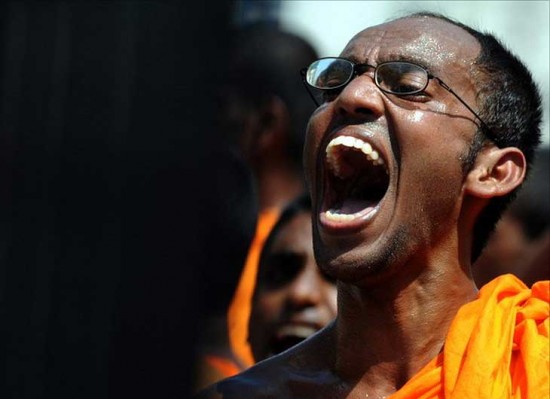Adopt Geneva resolution through consensus
Statement
A vote on the US-sponsored resolution aimed at promoting reconciliation in Sri Lanka is scheduled to take place later this week at the conclusion of the 19th session of the UN Human Rights Council in Geneva. Bitterness

Sri Lanka's State run media and sections of the Buddhist clergy reacted angrily to a US-led resolution passed in March 2012 demanding a war crimes probe and said the island had done well to go down fighting at the UN Human Rights Council in Geneva.The state-run Daily News said the 24 nations which voted in favour of the resolution urging a credible investigation into alleged war crimes during Sri Lanka's battle against Tamil rebels in 2009 were being destructive. The countries that backed the resolution were making "a desperate attempt to disempower and undermine Sri Lanka and they are trying every trick in the bag to further this dark design," the Daily News said. (Photo shows a protesting monk)
and rancor have accompanied the debate in Geneva.
The thrust of the proposed resolution in Geneva is the implementation of the recommendations of the Lessons Learnt and Reconciliation Commission appointed by the Government of Sri Lanka. However, the circumstances under which this resolution is to be passed has created division within Sri Lanka and the international community.
It is the conviction of the National Peace Council that human rights in Sri Lanka can best be protected by Sri Lankans themselves. We call on the Sri Lankan government to join the international community, even at this late stage, in crafting a mutually agreeable resolution and mechanism for monitoring that ensures the implementation of the LLRC recommendations.
The government and people of Sri Lanka need to take strength from the fact that the countries that are supporting the US-sponsored resolution in Geneva and also those that are opposing it, are giving a central place to the findings of the country’s own Lessons Learnt and Reconciliation Commission and its recommendations.
In the absence of mutual acceptance it is difficult to see reconciliation between Sri Lanka and the international community and between the different ethnic communities within the country as an outcome. Although only a few days remain before the vote is taken in Geneva, the National Peace Council urges that a resolution is approved consensually.
Governing Council
The National Peace Council is an independent and non partisan organisation that works towards a negotiated political solution to the ethnic conflict in Sri Lanka. It has a vision of a peaceful and prosperous Sri Lanka in which the freedom, human rights and democratic rights of all the communities are respected. The policy of the National Peace Council is determined by its Governing Council of 20 members who are drawn from diverse walks of life and belong to all the main ethnic and religious communities in the country.
